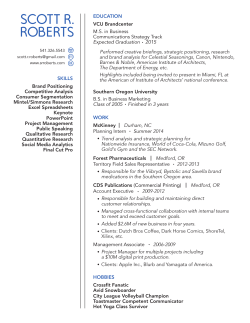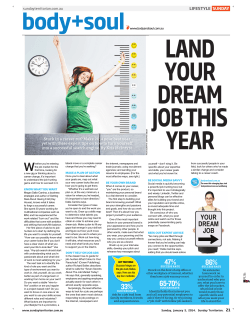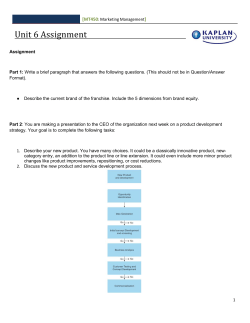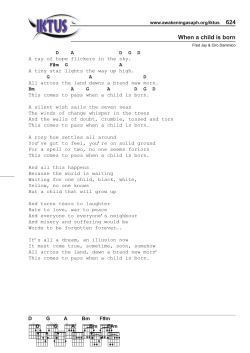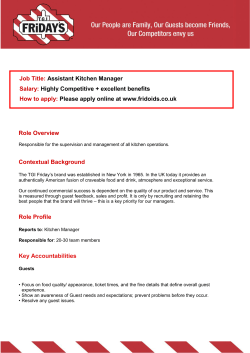
CV/Vita - BBR Accelerator 2015
1 CLAUDIO ALVAREZ April 2015 Boston University School of Management 595 Commonwealth Avenue Boston, MA 02215 EDUCATION Mobile: (857) 445-‐‑5858 Fax: (617) 353-‐‑4098 claudio@bu.edu Ph.D., Marketing, 2015 (expected) Boston University School of Management, USA M.S., Marketing, 2002 Coppead Graduate School of Business, Federal University of Rio de Janeiro, Brazil M.B.A. International Exchange Program, Fall 2001 University of Pennsylvania, Wharton School B.A., Social Communication (Advertising and Publicity), 1999 Pontifical Catholic University of Rio de Janeiro, Brazil PUBLISHED ARTICLES Fournier, Susan and Claudio Alvarez (2013), “Relating Badly to Brands,” Journal of Consumer Psychology, 23 (2), 253-‐‑264. Fournier, Susan and Claudio Alvarez (2012), “Brands as Relationship Partners: Warmth, Competence and In-‐‑Between,” Journal of Consumer Psychology, 22 (2), 177-‐‑185. OTHER PUBLICATIONS Alvarez, Claudio and Susan Fournier (2012), “Brand Flings: When Great Brand Relationships are Not Built to Last,” in Consumer-‐‑Brand Relationships: Theory and Practice, S. Fournier, M. Breazeale, and M. Fetscherin (eds.), London: Routledge/Taylor & Francis Group, 74-‐‑96. Alvarez, Claudio, Ozgun Atasoy, and Tejvir Singh Sekhon (2011), “MSI 50th Anniversary Celebration and Board of Trustees Meeting,” Conference Summary MSI Report, 11-‐‑301. RESEARCH INTERESTS Brand meaning, co-‐‑creation and brand meaning making, consumer-‐‑brand relationships, symbolic consumption, and brand management. CLAUDIO ALVAREZ | 2 HONORS, AWARDS AND DISTINCTIONS GfK Unrestricted Research Scholarship ($46,000), 2013-‐‑2015. Fellow, AMA-‐‑Sheth Foundation Doctoral Consortium, University of Michigan, 2013. Best Paper, People’s Choice Award for “The Lived Experience of Brand Flings” in the International Consumer-‐‑Brand Relationship Colloquium, 2010. Graduate Fellowship, Boston University, 2009-‐‑2013. Merit-‐‑Based Scholarship ($8,000), Coppead Graduate School of Business, 2000-‐‑2001. International Exchange Program Fellowship at Wharton, University of Pennsylvania; granted to the most highly ranked student at Coppead Graduate School of Business, Fall 2001. Merit-‐‑Based Scholarship covering full undergraduate tuition costs, Pontifical Catholic University of Rio de Janeiro, Brazil, 1995-‐‑1998. CONFERENCE PRESENTATIONS Alvarez, Claudio*, Remi Trudel, and Susan Fournier, “Brand Consensus and Multivocality: Disentangling the Effects of the Brand, the Consumer, and the Consumer-‐‑Brand Relationship on Brand Meaning,” Brands and Brand Relationships, Boston, May 2014. Alvarez, Claudio*, Remi Trudel, and Susan Fournier, “Brand Consensus and Multivocality: Disentangling the Effects of the Brand, the Consumer, and the Consumer-‐‑Brand Relationship on Brand Meaning,” Association for Consumer Research, Chicago, October 2013. Fournier, Susan*, Claudio Alvarez, and Jill Avery, “Disadoption through the Relationship Lens,” Association for Consumer Research, Vancouver, October 2012. Alvarez, Claudio*, Susan Fournier, and Jill Avery, “A Contracting Framework for Understanding Consumers’ Relationships with Brands,” Consumer-‐‑Brand Relationships, Boston, June 2012. Alvarez, Claudio and Remi Trudel, “The Effects of Dissociative Segment Adoption of Brand Extensions on the Evaluation of the Parent Brand,” Association for Consumer Research, Poster Session, Saint Louis, October 2011. Alvarez, Claudio* and Susan Fournier, “Brand Flings and the Transitional Self,” Association for Consumer Research, Jacksonville, October 2010. Alvarez, Claudio* and Susan Fournier, “The Lived Experience of Brand Flings,” International Consumer-‐‑Brand Relationship Colloquium, Winter Park, April 2010. *Presenter CLAUDIO ALVAREZ | 3 DISSERTATION “When Brand Meaning Gets Personal: Understanding the Prevalence and Antecedents of Brand Idiosyncrasy” (Dissertation defense scheduled for May, 2015) Committee: Susan Fournier (chair), Remi Trudel, Patrick Kaufmann Despite a rich stream of qualitative research demonstrating that brands gain meaning as individual consumers engage in relationships with them, most branding research and practice assume that brand meaning is predominantly consensual, such that people are generally expected to agree on what a brand stands for. This dissertation empirically tests the assumption of consensus and finds that, contrary to prevailing wisdom, a brand’s meaning is predominantly idiosyncratic rather than consensual. This finding was robust across three studies that sampled more than 50 brands in nine consumption domains and two aspects of brand meaning. Given the prevalence of idiosyncrasy in brand meaning, this research also explores which brand characteristics are associated with higher idiosyncrasy. Two studies suggest that brands are more idiosyncratic when they are more familiar to consumers and when they are consumed in private rather than in public. Finally, four additional studies investigate how the interaction between consumers and brands impacts brand idiosyncrasy. Results indicate that narrative communications lead to more idiosyncratic brand meaning than argument-‐‑based communications. They also indicate that increased brand experience results in higher brand idiosyncrasy. Overall, managers miss a lot of what brands mean to consumers when they focus only on the meanings that are shared across individuals, overlooking brand idiosyncrasy. Importantly, brand managers may influence brand idiosyncrasy with their choices regarding the nature and the level of interaction between the brand and consumers. Based on these findings, this research argues for a reconsideration of current theories and practices related to brand positioning and meaning management. RESEARCH IN PROGRESS “Where is this Relationship Going: Turning Points in Consumer-‐‑Brand Relationships,” with Susan Fournier and Jill Avery Target: Journal of Consumer Research; Status: multiyear data collection complete and analysis in progress. This research offers a longitudinal look at multiple relationship templates and uses the notion of turning points to explain fundamental relationship changes over time for a given consumer-‐‑brand dyad, as for instance, how a servant brand may become a friend. We identify four bipolar dimensions that capture differences across relationship templates and help explain relationship evolution processes. The data suggest that relationships reach turning points when a consumer’s experience challenges the existing configuration of the brand relationship template in one or more of these dimensions. CLAUDIO ALVAREZ | 4 “Brand Flings and Identity Play,” with Susan Fournier and Pankaj Aggarwal Target: Journal of Consumer Research; Status: qualitative analysis complete and experiments in progress. Marketing has long focused on the value of committed, long-‐‑term brand relationships to the exclusion of other potentially valuable relationship forms. This study focuses on one such relationship manifestation: the brand fling. In-‐‑depth ZMET interviews provide phenomenological insight into the construct with the identification of four core dimensions: brand flings are passionate, a focus of consumer attention, frivolous, and transient. Identity play is a central motive for fling engagements: consumers experiment with possible selves as they fleetingly bring brands in and out of their lives. Experimental work further explores identity play by investigating two ways in which consumers can engage with brands when a possible self is activated. Consumers may experience the brand as a means to become the possible self (e.g., “wearing the brand is helping me become an athlete”) or as its fantasized realization (e.g., “I feel like an athlete when I am wearing the brand”). Our core hypothesis is that fantasizing about a possible self leads to brand flings, whereas using the brand to operationalize the possible self leads to higher levels of commitment characteristic of brand marriages. This research illuminates the phenomenology of a profitable brand relationship and reveals an important mechanism through which consumers use brands to construct their sense of self, with important implications for managers. TEACHING EXPERIENCE Boston University Undergraduate Program (Lecturer), Branding, Spring 2012. Instructor evaluation: 4.35 / 5.0. Boston University M.B.A. Program (T.A.), Branding, Spring 2014. Boston University Summer Program (Lecturer), Fundamentals of Business, Summer 2012-‐‑2013. Instructor evaluation: 4.49 / 5.0. Pontifical Catholic University of Rio de Janeiro Undergraduate Program (T.A.), Communication Theory I, Rio de Janeiro, Brazil, Spring and Fall 1996. TEACHING INTERESTS Brand Management, Marketing Management, Marketing Research, Consumer Behavior, Marketing Strategy. CLAUDIO ALVAREZ | 5 GRADUATE COURSEWORK Marketing: Customer Focused Marketing Management I Customer Focused Marketing Management II Consumer Behavior I Consumer Behavior II Marketing Models (Harvard Business School) Susan Fournier Shuba Srinivasan Sucharita Chandran Susan Fournier Thomas Steenburgh Minor: Social Psychology Personality Theory Understanding Consumer Culture (Boston College) Analyzing Culture: Dialogue, Discourse, and Theme (Harvard Graduate School of Education) Methods: Statistics in Psychology I Statistics in Psychology II Experimental Design and Statistics (Boston College) Publication and Dissemination of Knowledge Philosophy of Science Theory, Method, and Techniques in Anthropological Fieldwork Field Study Seminar Tibor Palfai Michael Fleming Juliet Schor Helen Haste Timothy Brown Timothy Brown Ehri Ryu Janelle Heineke Patrick Kaufmann Charles Lindholm Karen Golden-‐‑Biddle ACADEMIC SERVICE Service to the field: Reviewer for ACR, Consumer-‐‑Brand Relationships, European ACR, and Academy of Marketing Science Conferences. Trainee reviewer for Journal of Consumer Research, 2012-‐‑2014 (with Prof. Susan Fournier). Service to the school: Vice-‐‑President of the PhD School of Management Association, Boston University, 2011-‐‑2013. PROFESSIONAL EXPERIENCE Monitor Group (currently Monitor Deloitte), Senior Case Team Leader in the Marketing Strategy Business Unit (M2C), Cambridge, US, 2007-‐‑2009. Monitor Group (currently Monitor Deloitte), from Consultant to Senior Case Team Leader in the Latin America Business Unit, 2002-‐‑2007. CLAUDIO ALVAREZ | 6 REFERENCES Susan Fournier Professor of Marketing Questrom Professor in Management Boston University School of Management 595 Commonwealth Avenue Boston, MA 02215 Phone: (617) 353-‐‑2773 fournism@bu.edu Patrick Kaufmann Professor of Marketing Everett W. Lord Distinguished Faculty Scholar Boston University School of Management 595 Commonwealth Avenue Boston, MA 02215 Phone: (617) 353-‐‑4278 patk@bu.edu Remi Trudel Assistant Professor of Marketing Boston University School of Management 595 Commonwealth Avenue Boston, MA 02215 Phone: (617) 358-‐‑3316 rtrudel@bu.edu
© Copyright 2025


